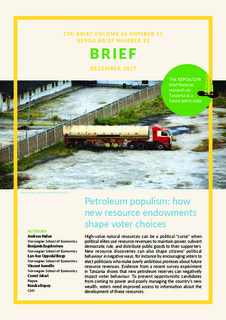| dc.contributor.author | Stølan, Andreas | |
| dc.contributor.author | Engebretsen, Benjamin | |
| dc.contributor.author | Berge, Lars Ivar Oppedal | |
| dc.contributor.author | Somville, Vincent | |
| dc.contributor.author | Jahari, Cornel | |
| dc.contributor.author | Dupuy, Kendra | |
| dc.date.accessioned | 2018-01-04T08:23:52Z | |
| dc.date.available | 2018-01-04T08:23:52Z | |
| dc.date.issued | 2017-12-01 | |
| dc.identifier | oai:www.cmi.no:6395 | |
| dc.identifier.citation | Bergen: Chr. Michelsen Institute (CMI Brief vol. 16 no. 11) 4 p. | |
| dc.identifier.issn | 0809-6732 | |
| dc.identifier.uri | http://hdl.handle.net/11250/2475457 | |
| dc.description.abstract | High-value natural resources can be a political “curse” when political elites use resource revenues to maintain power, subvert democratic rule, and distribute public goods to their supporters. New resource discoveries can also shape citizens’ political behaviour in negative ways, for instance by encouraging voters to elect politicians who make overly ambitious promises about future resource revenues. Evidence from a recent survey experiment in Tanzania shows that new petroleum reserves can negatively impact voter behaviour. To prevent opportunistic candidates from coming to power and poorly managing the country’s new wealth, voters need improved access to information about the development of these resources. | |
| dc.language.iso | eng | |
| dc.publisher | Chr. Michelsen Institute | |
| dc.relation | CMI Brief | |
| dc.relation | 2017:11 | |
| dc.relation.ispartof | CMI Brief | |
| dc.relation.ispartofseries | CMI Brief vol. 16 no. 11 | |
| dc.relation.ispartofseries | CMI Brief vol. 16 no. 2017:11 | |
| dc.relation.uri | https://www.cmi.no/publications/6395-petroleum-populism | |
| dc.subject | Petroleum | |
| dc.subject | Voting | |
| dc.subject | Natural Resources | |
| dc.subject | Tanzania | |
| dc.title | Petroleum populism: How new resource endowments shape voter choices | |
| dc.type | Report | |
